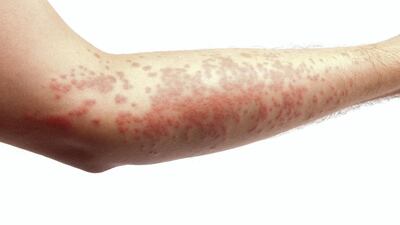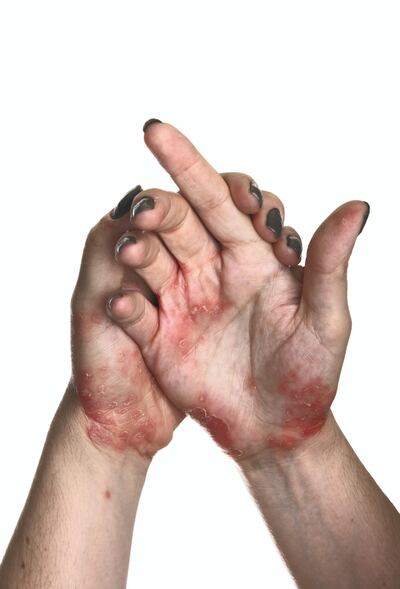A UAE hospital has launched a nationwide drive to raise awareness about psoriasis, as misconceptions over the chronic skin condition threaten to drive families of those affected apart.
Tawam Hospital in Al Ain is aiming to tackle the 'stigma' of the disorder and ensure patients do not have to suffer in silence.
Psoriasis, which affects about 125 million people across the globe, is caused by an overactive immune system.
Typically, skin cells are replaced every 28 to 30 days. In psoriasis, new cells grow and move to the surface of the skin every three to four days.
The extra skin cells form scales and red patches that are itchy and sometimes painful, while flaking of the skin is another common symptom.
Dr Fatima Albreiki, consultant dermatologist at Tawam Hospital, said that while the condition is increasingly prevalent, she still has to dispel myths that it is contagious.
The doctor said she has seen two couples divorce in the past decade over this wrongly-held belief.
Setting the facts straight is one of the reasons for a campaign set up to provide vital support for people battling the condition.
"It is the most common question I am asked : 'Is it contagious?'," Dr Albreiki said.
“Sometimes, a couple will walk in to my clinic and after the consultation, the husband will wait for his affected wife to leave to ask me if it is contagious.
“It causes a lot of problems and has disrupted many families.”
The health initiative sets out to highlight the difficulties faced by patients on a daily basis.
"Psoriasis is an increasingly common noncommunicable inflammatory skin disease that carries great stigma," said Dr Albreiki.
"The condition can greatly impact patients’ quality of life and implicate great physical, emotional and social burden. This is not just a simple cosmetic problem, but one that impacts every aspect of a patient’s life.”
AS, 46, who did not wish to disclose her full name, was diagnosed with the condition 12 years ago, at the age of 34.
“A month after the birth of my son, I felt a heat in my body and my nails started bending and bleeding. Then my skin began feeling rough and dry,” she said.
The mother-of-three is on a comprehensive course of medication for her psoriasis, which makes her prone to regular infections.
She said the condition has caused significant emotional and physical damage.
"Psoriasis has damaged my bones and narrowed my veins. It has affected my hearing and eyesight. I used to cry every single day. Imagine waking up every day covered in flakes.
"The emotional damage is huge. I could not put on my clothes, leave the house or do anything. I would lock myself in the house if I did not have to work.
“You can never imagine how much we suffer. We have constant joint pain and swelling."
Her youngest son, aged 12, also has psoriasis which has affected his joints. He was four when he was diagnosed. Both his legs and arms are covered in scales.
“In the middle of the summer and the heat, he is in long sleeves and jeans. He cannot play any sports because he is injured easily and can’t handle any strain on his joints. He feels different,” she said.
While there is no cure for the condition, Dr Albreiki said it can be managed by taking care such as moisturising, quitting smoking and reducing stress.
Studies indicate there is a link between severe psoriasis and an increased risk of early death.
“We want patients from all over the UAE to come forward, connect and support each other in a multitude of ways," said Dr Albreiki.
"This campaign is vital in the way it could revolutionise the way psoriasis patients live and the way they are perceived by the society."


